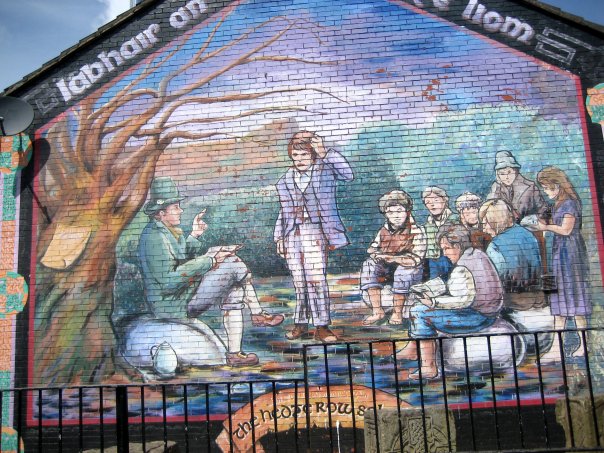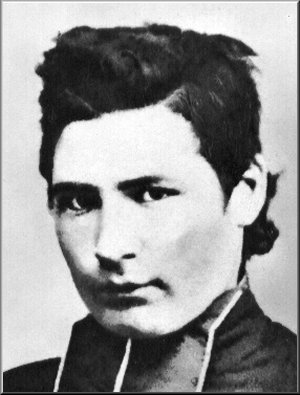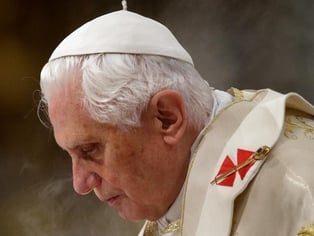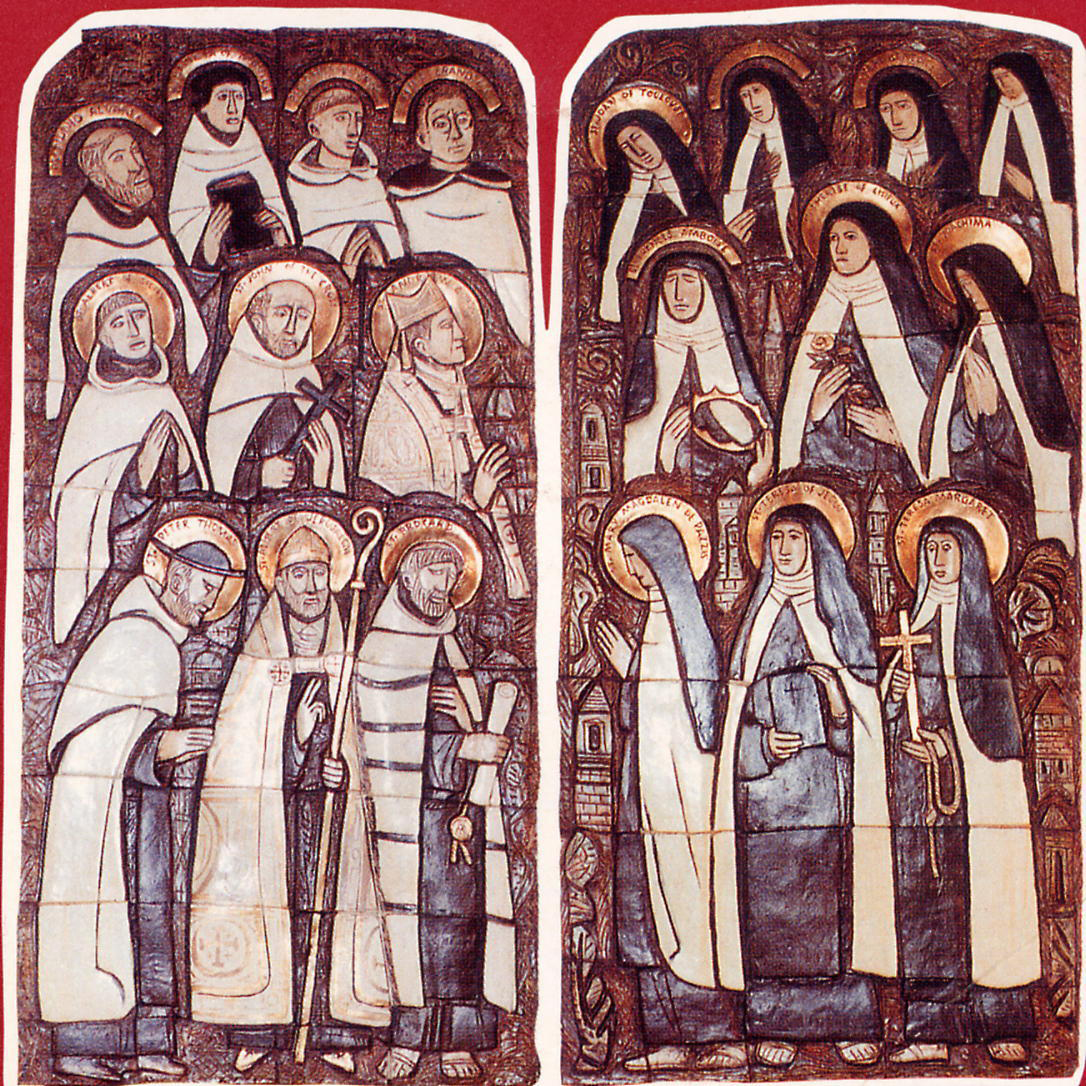
At a prayer group last evening, I gave a talk on one of the Church's new Blesseds - the mystic Blessed Elena Aiello. What an amazing life! A contemporary of St Pio of Pietrelcina, her life mirrors his to a great extent, and she was as famous as him in life. I thought you might like to read something about her, so I'm posting the talk I gave for your information. She is well worth researching. Her prophecies are very unsettling. There is very little on her in English - I hope as her congregation begin to work on furthering her Cause, they will begin to make more material available. What better way to spend a dark winter's night than pondering over fearful prophecies - always a good spur to getting you to confession!
Blessed Elena Aiello
This evening we reflect on the life and mission of one of the newest Blesseds in the Church, and indeed one of the most remarkable mystics of the 20th century, one who is little known outside of her native Italy. Blessed Elena Aiello was beatified in Calabria on the 14th September last, the feast of the Exultation of the Holy Cross – a very appropriate feast day indeed. It seems, as we reflect on her life and teachings, that the Beata lived under the shadow of the cross, embraced it wholeheartedly, and indeed found her sanctification in sharing the mystery of suffering with her Divine Master.
Elena Aiello was born in Montalto Uffugo near Consenza, in the Italian region of Calabria, on the 10th April 1895. That day was Spy Wednesday, and the great Triduum was about to begin: what a providential sign for a woman who would live her mystical life in the heart of the events of Holy Week. Her mother, Teresa Aeillo, had prayed for a girl, promising that if her prayer was granted she would call the child after the empress St Helen, and consecrate her to the Holy Cross: her prayer was heard, and so the little girl was baptised Helen, or Elena in Italian. Both her parents were simple, hardworking and devout people, and Elena learned to follow their example from an early age. While still a child she prayed a great deal and practiced penances. There are numerous stories from her childhood which demonstrate this love of penance: she often wore a penitential belt.
It seemed natural that Elena would gravitate towards a religious vocation. She had promised Our Lady that she would become a nun if she was healed of a persistent cough and damage to her voice which had resulted from it. She prayed to the Holy Virgin under her title, Our Lady of Pompei, and in response Our Lady appeared to her and assured the girl that she would be cured: she was, and she remained true to her promise: she would offer her life to God in the religious life.
While she was keen to enter religious life as soon as she could, numerous things stood in her way. The First World War was raging, and as she intended to enter the convent in 1915, her father asked her to wait until the war was over: she was needed at home. Accepting this as a sacrifice, she waited, but the wait proved providential. During those years she found herself helping those affected by the war: refugees, prisoners of war, the sick and the dying. In her service of these people, charity began to grow stronger in her heart and her love of those in need deepened – it was a love which would be required of her in great measure later in her life.
One event during these years had an enormous effect on her. One of the men she was nursing was a freemason. Concerned for his soul, she tried, gently, to bring him to faith and persuade him to accept the Sacraments. Not only did the man refuse, but furious at her suggestions, he flung a bottle at her which struck her in the neck inflicting a deep wound. Trying to stop the copious bleeding with a cloth, Elena did not move: she told the man that she would stay with him until he asked for a priest. After he got over the shock, he was moved and asked for the priest, but on the condition that she would nurse him. Again true to a promise, Elena cared for him for three months until he died: he was reconciled with Christ and passed away peacefully.
On 18th August 1920, Elena finally got her wish, as she entered the Sisters of the Precious Blood, the congregation which ran the school she had attended. God told her, however, that she would not stay in this congregation – he had other plans for her. Trusting in him, she went forward. She was soon struck down by illness – intestinal pain and a severe pain in her shoulder where a tumour soon manifested itself. An operation, performed in March 1921, without anaesthetic, helped in part, but the surgeon mistakenly cut nerves, leaving her with lockjaw. She continued preparing for her vows, living with intense pain. A decision was made by her superiors: she would have to leave the congregation.
After a time the doctor told her her shoulder had become gangrenous, but things got worse: she was no longer able to retain food – she was soon diagnosed as having stomach cancer. The doctor told her she was dying, but Elena responded: “St Rita will make me well”. And she was correct: St Rita appeared to her and assured her she would be healed, but asked that devotions to her be held in Montalto as a means of rekindling the faith of the people of the area. The painful shoulder, however would remain, St Rita said, because God wanted Elena to offer her suffering for the sins of the world. Elena was true to the promise to St Rita, and she gladly entered into her vocation of suffering. A retreat with the Passionists led her to a great devotion to the Passion of Christ. A new era was to begin for her: she began to suffer the passion herself.
On Good Friday 1923, Elena, having a vision of Christ crowned with the Crown of Thorns, placed the crown on her head and conferred on her the stigmata of the crown: blood poured out of her. The following Friday the same happened again. Until her death, every Friday, Elena began to suffer the passion, shedding much blood as the wounds appeared on her body. The wounds of the stigmata appeared over time and remained on her body for the rest of her life. Various other phenomena manifested themselves, and St Rita continued to appear. Eventually her shoulder was healed.
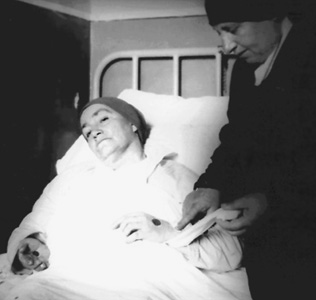
Another vocation lay in store for her: God was calling her to found a new congregation. As the great saint of Calabria, Elena had a great devotion to St Francis de Paolo, the founder of the Minim friars – she was destined to follow him and found a new congregation living according to his spirit and teachings. Meeting a young woman who was searching for a community, and having asked St Therese of Lisieux for help, Elena experience a manifestation of St Therese and was given money help start a foundation. In 1928 she founded the Sister Minims of the Passion of Our Lord Jesus Christ, dedicated to looking after orphans and women in need. Vocations came, and as she formed and guided her new community, Mother Elena, as she was now known, continued to suffer her passion experiences together with various other mystical phenomena. People began to find out about her and the curious and pious arrived: sometimes the sisters had to hide their foundress in a locked attic to protect her and keep her from the pious hysteria of some visitors.
Numerous stories and miraculous occurrences surrounded the rest of Sr Elena’s life. Divine Providence provided for the needs of the sisters. She began to receive numerous prophecies, some apocalyptic in nature. She wrote to Benito Mussolini warning him against a pact with Hitler and going to war: if he ignored her warnings, Italy would be devastated and he himself would be severely punished. He ignored the warning and what she said came to pass. We do not have time to go into all the messages and indeed every aspect of her life – there is plenty for us to discover as we explore her life in greater detail in the months and years to come.
As famous as St Pio of Pietrelcina, with crowds coming to see her, ask her advice and seek her prayers, Mother Elena was deeply venerated. A faithful daughter of St Francis de Paolo, she grew in humility and holiness, bearing the wounds of Christ and advising people to give their hearts to him. For as long as she could, she worked side by side with her sisters, caring for the poor and orphaned. On 19th June 1961 her mission on earth was over, her mission in heaven was about to begin. Just before dawn broke, Mother Elena died, surrounded by her community and holding in her hand an oil lamp burning brightly, a fitting symbol for one who had sought to shine the light of Christ, through her life and suffering, to every corner of the world.
Further information can be found on this blog.


